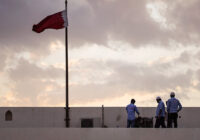A month on from the deal signed between Turkish President Recep Tayyip Erdogan and Russian President Vladimir Putin in Moscow, a truce remains in place in Idlib, the last rebel redoubt in Syria. The deal allowed Syrian President Bashar al-Assad, who was notably not involved in the negotiations, to hold onto the substantial gains he had already made in the province. And it confirmed a security corridor to the north and south of the key M4 motorway that runs from Aleppo through to the Mediterranean coast, with joint Russian-Turkish patrols along the M4 intended to secure and hold the ceasefire.
Assad’s warplanes, which had repeatedly struck non-military targets in Idlib, disappeared from the skies, leaving a civilian population — many of them already internally displaced — with a very thin strand of hope that they might somehow survive. However, Erdogan could take little solace from the deal other than that the threat of refugees attempting to cross into Turkey was checked. Putin, on the other hand, had once again shown a deft hand, protecting Russia’s influence while displaying his mastery of the Turkish leader.
Russia Makes Its Move
At the Moscow meeting, carefully placed statuary celebrated Russian triumphs over the Ottomans and underscored Putin’s intention to make it abundantly clear to Erdogan and his entourage who was in the driver’s seat. Writing on Al-Monitor, columnist Cengiz Candar drily observed: “For anyone familiar with Putin’s penchant for symbolism in messaging his politics, the choreography of the Kremlin reception with Erdogan looked very diligently planned to humiliate and impose on him a Syria deal on Russia’s terms.”
Recent moves by the Russians indicate that the Kremlin has every intention of strengthening its military hold in Syria. The Washington-based Institute for the Study of War (ISW), in its most recent assessment, details two moves.
The first involved the use of Qamishli Airport in the northeast province of Hasakah as a base for fixed-wing aircraft, including the SU-25 fighter. The second move was the passage of a ship from the Russian navy’s Black Sea Fleet en route to the port of Tartus, reportedly carrying unspecified weapons and military equipment to reinforce Syrian regime troops. A second ship, Reuters reported, was carrying military ambulances, presumably as part of an effort to combat the novel coronavirus known as COVID-19, though the Russians denied they had any cases among their soldiers stationed in Syria.
For its part, the Israelis have continued a policy of hitting what they believe are Hezbollah targets inside Syria. The most recent attack, one that Israel has yet to publicly announce, was a raid on al-Shayrat airbase on March 31, near the central city of Homs. The base is said to be used by the Iranians to bring weapons into the country. If the reports are correct, it would be the second time that al-Shayrat has been hit in less than a month. Clearly, the strategy is to keep Hezbollah on edge and to curtail its military capacity to launch missiles into Israel while avoiding any actions on the Syrian front that would cause friction with Russia. (In September 2018 a Russian military aircraft was accidentally shot down after Israeli fighters forced the plane into the path of a Syrian missile.)
Speaking to the UAE
One other player keeping a close eye on Syria is the Abu Dhabi’s crown prince and de facto ruler of the United Arab Emirates, Mohammed bin Zayed. MBZ, as he is known, had re-established diplomatic relations with Syria in 2018. In December of last year, the Emirati charge d’affaires in Damascus, Abdul-Hakim Naimi, without a doubt instructed to do so by MBZ, went out of his way to lavish praise on President Assad, speaking of “his wise leadership” and “the solid, distinct and strong relations” between their two countries.
On March 27, MBZ tweeted: “I discussed with Syrian President Bashar [al-Assad] updates on COVID-19. I assured him of the support of the UAE and its willingness to help the Syrian people. Humanitarian solidarity during trying times supersedes all matters, and Syria and her people will not stand alone.”
On March 30, the Syrian regime announced the first coronavirus death. But there are deep concerns that the Assad government has both underestimated and underreported the true extent of the situation. A health service battered by nine years of civil war, hugely overcrowded prisons filled with oppositionists, and millions of internally displaced people are all cited as setting the country into the path of a huge and emerging coronavirus crisis. So, offers of support from the UAE are timely, even if tinged with political opportunism.
Missing in action are the Americans. Ever since President Donald Trump’s announcement in October 2019 of the withdrawal of US forces from Syria — subsequently modified after it was made clear to him the extent of damage such a step would entail — the US has had little to say and nothing of substance to offer. This was as good an indication as any that when it comes to Syria, it is Vladimir Putin who is playing the war like a chess match and making all the right moves.
*[This article was originally published by Arab Digest.]
The views expressed in this article are the author’s own and do not necessarily reflect Fair Observer’s editorial policy.
Support Fair Observer
We rely on your support for our independence, diversity and quality.
For more than 10 years, Fair Observer has been free, fair and independent. No billionaire owns us, no advertisers control us. We are a reader-supported nonprofit. Unlike many other publications, we keep our content free for readers regardless of where they live or whether they can afford to pay. We have no paywalls and no ads.
In the post-truth era of fake news, echo chambers and filter bubbles, we publish a plurality of perspectives from around the world. Anyone can publish with us, but everyone goes through a rigorous editorial process. So, you get fact-checked, well-reasoned content instead of noise.
We publish 2,500+ voices from 90+ countries. We also conduct education and training programs
on subjects ranging from digital media and journalism to writing and critical thinking. This
doesn’t come cheap. Servers, editors, trainers and web developers cost
money.
Please consider supporting us on a regular basis as a recurring donor or a
sustaining member.
Will you support FO’s journalism?
We rely on your support for our independence, diversity and quality.






